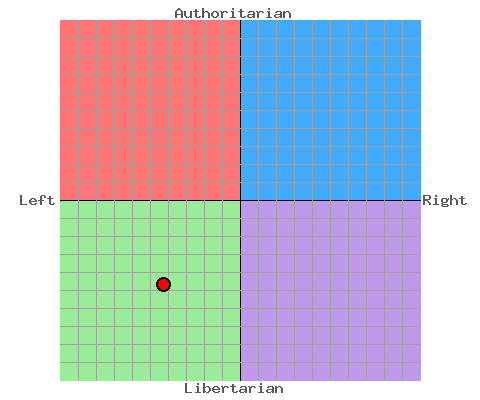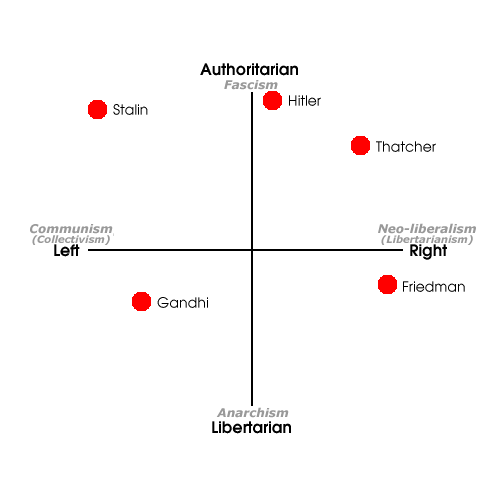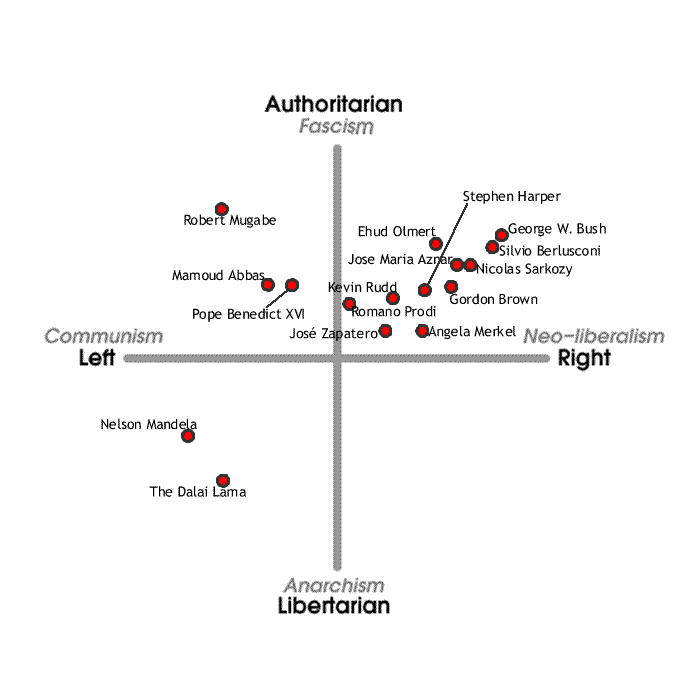For the first time in my life I have started using a paper-based diary (two days to a page, academic year diary for 2008 - 2009).
It is so liberating!!!! For the first time for a while I actually feel like I? organised! It? great, I? able to record all my forthcoming events:
- University events
- Random geeky meetings in Bristol that I? like to attend
- Hospital appointments
- Some other important events which are coming up
- Work stuff
It? fantastic!
You see, this is the interesting thing… no matter how far we advance technology, it? still easier to use a paper and pen for organising yourself. Maybe I should get one of those InfoScan pens and hook it up to ODS.
As one of my further education college tutors used to say back in 2002:
Organisation is the key to success
My political position:

Some well known people:

Some more well known people:

It? interesting. I took “The Political Compass” test. I? strangely close to people like Gandi, Mandela and the Dalai Lama.
Everything we do here in the UK is taxed, I? not sure what it? like elsewhere around the world but in the UK we?e got:
- Income Tax (which is tax on what we earn)
- National Insurance (this specifically goes on things like the NHS and the State Pension)
- Value Added Tax (which is a tax slammed across most products, and is usually 17.5% in England for the products that have it)
- Council Tax (which is a tax paid to the local/regional councils in order to run the area, things like the Police, the Rubbish Collections and things like that are paid for in this tax)
- Corporation Tax (a tax on the profits of businesses)
- Excise Tax (an additional tax for certain products which are produced inside the UK)
- Customs Tax (an additional tax for certain products which are produced outside the UK)
- Stamp Duty (which is a tax for something to do with transferring shares)
- Inheritance Tax (tax on a transfer of valuable things to another person)
- MOT (Motoring Tax)
- Business Rates (an alternative to Council Tax, but for businesses)
There are just way too many taxes in the UK. Maybe its worth being so split up, maybe it? not…. I? trying not going to judge. I? just like to make sure that it? being spent on worthwhile things.
I?e been thinking about taxes and money because I?e had to sort some things out this lunch time ready for starting the university course — the financial situation is looking a little tight… I?l just have to see how it goes.
Good news for the Linked Data community comes from Berlin student Christian Becker, who provides us with information about BBC Interlinking with DBPedia:
…
commissioned to create links between DBpedia and an internal BBC vocabulary, which enable the BBC to use DBpedia/Wikipedia as a
controlled vocabulary
…
Keep up the good work Christian!
OK, so I?e just got my login details for the “MyBristol” system, which is the University of Bristol? portal for Staff and Students. I have to say, I am incredibly impressed by the whole system.
It? got:
- A personalised home page (looking a bit like iGoogle), including tabs and widget-style subwindows
- Integration with the Bristol WebMail (based on SquirrelMail)
- Course detail integration. INCLUDING integration with Blackboard
- A simple bookmarking system (looking like a simplified version of del.icio.us), preloaded with useful related bookmarks
- An RSS feed reader, preloaded with useful related feeds
- A “Contacts”/Address Book system
- A PDF Converter
- Print Credit integration
- Personal Information viewing/editing
- Library integration
- Student Union integration (probably reusing the RSS Feed Reader)
- Themes!
This looks trillions times nicer to use than the old “PIP” system that I had to use back when I was at Oxford Brookes University. I mean, themes! It? also has a lot more functionality.
One thing that I am quite surprised that MyBristol doesn? have, is a Calendar. It would be useful to have a Calendar.
Interestingly, the MyBristol system is actually quite similar to the OpenLink Data Spaces system. Except ODS is a lot more general, and provides even more functionality. Plus ODS is available to everyone, whereas MyBristol is just for University of Bristol staff and students.
It? also be nice to see a SPARQL endpoint on MyBristol, which is something that ODS does provide.
Still, I? very impressed by MyBristol. Well done to the Information Services and ILRT departments at Bristol.
Friday of last week (aka 12th September 2008) I was in hospital getting a heart monitor fitted because of my Dilated Cardiomyopathy. I have to wear it until this coming Friday, when I have to go into hospital again to hand it in.
Monday of this week (aka 15th September 2008) I was in hospital again, this time for an “Exercise ECG and blood pressure” test.
I obviously got some basic results from the Exercise test, and luckily my heart is doing alright under stress.
However, having all of these tests, and specifically having a heart monitoring device stuck to me 24/7 is making me feel quite sad…. coupled with having to take medication each day for the rest of my life (which I? still getting used to, it does have some side effects). It? just not good at the moment.
This is why, I? looking forward to starting something new. I?l be starting the Masters (MSc) very soon (formally at the start of October). It?l be something to keep my mind on, and take my mind off of hospitals and my medication. It?l also get me out of the house more, which will be a lot better for my mental and physical health!
I couldn? agree more with Nadeem when he says:
It? so easy to become disenchanted due, as a species, to our seemingly limitless apathy, yet what is truly regrettable is that because of that apathy it? often hard for us to remember our achievements, and the limitless potential within us.
I?e just done a blog post on “Linked Data is more important than the Large Hadron Collider“, and that got me thinking about the whole Holistic
and Reductionistic points of view.
Everything that we do has an effect on other people or things, and this is why it? important to do everything with care. We can achieve care by looking at everything with:
- A holistic view and a reductionist view
- A liberal view and a conservative view
- A forward-thinking (futuristic) view and a now-thinking (contemporary) view and a backward-looking (historic) view
- An artistic view and a scientific view
- A rational view and what might seem as irrational
Some of these are really hard to achieve, but it? incredibly important to try.
For example:
- If you are conservative, then try to think about what you believe in a liberal point of view. For instance, a lot of conservative Christians are against gay marriage, try to think about it from the liberal Christian perspective, that not all people are Christian let alone of the same tradition within Christianity. Marriage has taken on a more secular perspective, and it has legal benefits. Liberal Christians should also look on the at conservative Christianity, conservative Christians believe that the bible is entirely literal and free from error, and they achieve spirituality from that, then of course they would be against gay marriage. (This way of thinking also applies to Conservative and Liberal politics)
- In order to achieve an overall understanding of an experiment, it? important to take in what has happened before, where we are now, and all possible outcomes of the experiment. (This way of thinking also applies to business ventures)
- Atheists (such as Richard Dawkins) tend to look at people like Charles Darwin with an entirely Rationalistic point of view…. this isn? good. How about the Irrational point of view? Yep, thats a strange question for people who stick with a rationalist approach. The works of Darwin can actually be looked at from an Irrational point of view. Darwin took a big leap from what was generally believed during his time, but maybe it can be looked at from a spiritual point of view. This works from the other point of view, who work irrationally (e.g. those who believe that the earth is flat, or only 6000 years old), try to think about your beliefs rationally.
The key to all of this is the enhancement of belief and the enhancement of the outcome of certain things that we do and say. By appreciating other peoples perspective, you can achieve the whole perspective, which then assists in the minimalisation of bad-effects.
There is one final point which is important to try our best to live by, but we all (very) often fail:
Yeah, you heard me right:
Linked Data is more important than the Large Hadron Collider
My points:
- I feel that the Large Hadron Collider is a bit of a waste of time, money and a big waste of energy (think of all the carbon emissions!).
- Why do we need to know the very very smallest parts of things?
- Why do we need to know what happened microseconds after the big bang?
- Why not just analyse what happened if the Higgs Boson was and wasn? found (every possible aspect)?
- Face it: It? not going to cure Cancer, or prevent HIV
- Face it: we?e still going to be here whether or not the Large Hadron Collider was successful
- Linked Data on the other hand is incredibly important
- Everything in real life (conceptual/abstract and objective/physical) is interconnected with everything else
- We have a lot of data about everything, but it? not interconnected
- Linked Data allows for the interconnectedness of data, and therefore true computation modelling of everything. Which then allows for a real and useful insight into scientific (and artistic and historic) data!
- Just imagine a world where you can easily browse through the history of the atom, and then delve into the science found on the atom, and then go deeper into the subatomic level, and then browse back out into the historic realm, finding out about experiments that happened and whether it had any impact on society.
- Thanks to Linked Data:
- a lot of problems can be solved before they arise
- new areas of research can be formed
- “recreating the wheel” can be prevented
- a really interesting browsing experience can be achieved
So there we go. That is why Linked Data is more important than the Large Hadron Collider….
Sorry to the physics-geeks, but maybe you can gain something useful from Linked Data if you aren? already. I know that some Chemistry and Physics people already have some Semantic Web / Linked Data research & development going on, and hey Tim Berners-Lee did start the Web project at CERN.
I fear that a lot of people within science and even computer science forget to look at things with Holistic eyes, as a lot of science and mathematics is incredibly Reductionist.
Well, iTunes 8.0 has been released….
Good things:
- The new 3D Visualisations are nice.
- Accessibility features are good
Bad things:
- I really don? like the new Grid View… nasty… I didn? like it when cuil.com did it either
- I can? see a use for the Genius Sidebar, I have it switched off
Also, it doesn? seem to be much of an upgrade really. There? absolutely nothing exciting on it. Recently I?e been getting more enjoyment from the Jamendo and Magnatune connections that Rhythmbox Music Player on Linux offers.
Even the HD TV shows that are available, obviously that depends on whether you?e got a connection up to an HD TV/Monitor.
I expected a lot better from Apple with iTunes 8… like Genre sameAs Genre relationships, and connecting up with wikipedia or MusicBrainz or IMDB in order to tell you about bands or movies.
Nope, not really impressed with anything other than the 3D visualisations.



